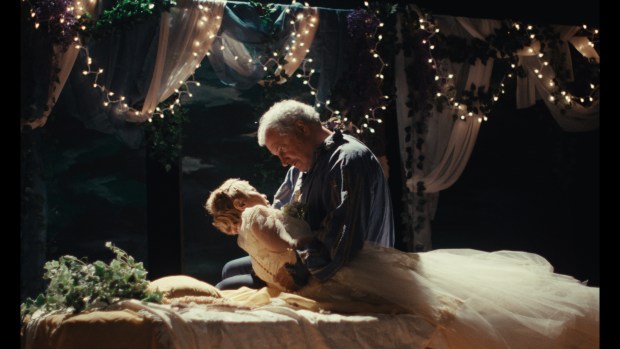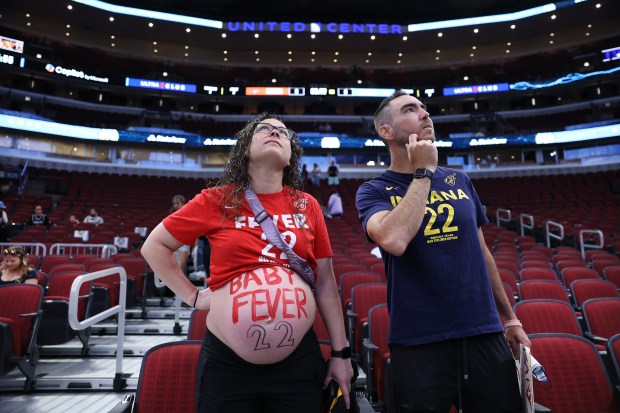If you’re married or otherwise committed to someone, and you decide to make movies together, well, “I don’t know,” says screenwriter, actor and director Kelly O’Sullivan. “It sounds like a real relationship killer.”
O’Sullivan told me this the other morning in the living room of the fourth-floor Rogers Park walk-up she shares with director and screenwriter Alex Thompson. They’re partners, with a 6-month-old son, Milo. And they just co-directed a movie together.
Sounds like trouble, Thompson concurs with a smile. “Which is why we waited a year or two into our relationship to make a film together.”
That 2019 Chicago-made film, “Saint Frances,” starred O’Sullivan, well-known and respected for her work on many stages around town, as a 34-year-old nanny navigating a series of relational crossroads with her newfound employers, their little girl and her own ambitions.
Five years later, they’re back in strong form, this time as co-directors of O’Sullivan’s “Ghostlight.” It’s a tender comedy-drama starring Keith Kupferer, a veteran Chicago stage actor as well as a regular TV and sometime film presence, in a rare leading role as construction worker Dan, a tightly clenched man clouded by the family tragedy O’Sullivan’s screenplay gradually reveals.
Katherine Mallen Kupferer, Keith Kupferer’s real-life daughter, ignites the role of Dan’s daughter, whip-smart, touchy, grieving in disharmony with both her parents. Her mother, Tara, is played movingly by another Chicago stage veteran, Tara Mallen, married to Keith and mother to Katherine. The family feeling is everywhere in “Ghostlight,” its title referring to the single-bulb lamp traditionally left illuminated on a theater stage when all else goes dark.
Avoiding his daughter’s therapy session one day, Dan meets a cast member of a no-budget storefront theater production of “Romeo and Juliet” by accident. This woman, Rita, smoking and bitter but sneakily big-hearted, is portrayed by Filipino actor Dolly de Leon, a 2022 Golden Globe nominee for the black comedy “Triangle of Sadness.” In a blink, Dan is thrown into rehearsals (they’re short one actor and he’s the first available human to wander by). In another blink, Dan moves into the role of teenaged Romeo, opposite Rita’s Juliet, likewise middle-aged and unconventionally cast in Shakespeare’s tragedy of enraptured young love.
The theatrics afoot in “Ghostlight” suggest a situation comedy, or at least a comic situation. The feelings underneath suggest otherwise. Its world premiere screenings had audiences in tears at the January 2024 Sundance Film Festival. This spring’s Chicago Critics Film Festival “Ghostlight” screening at the Music Box Theatre: different crowd, same tears —though that time, some assuredly were tears of joy at the sight of Lincolnwood’s beloved Novelty Golf and the adjoining Bunny Hutch.
IFC Films picked it up for theatrical distribution (100-plus U.S. screens) straight out of Sundance. Filmed in Waukegan and Chicago neighborhoods, the film opens commercially here and in New York on June 14, other U.S. markets June 21.
As for the relationship-killing part of co-directing: So far, so good. “We figured out it’s a lot like parenting together,” O’Sullivan says. “Co-directing, parenting — very similar.”
She and Thompson shot “Ghostlight” last September. At one point, O’Sullivan, eight months pregnant and dealing with COVID, co-directed in temporary isolation via monitor and walkie-talkie, communicating with Thompson on set.
That sounds stressful, yet nine months hence the key actors still talk about how not-stressful the filming days were. Ever. They talk about how Thompson’s visual and technical skills and comforting vibe complemented the actor-whisperer acumen of O’Sullivan, already well known to the Kupferers from their overlapping work on many Chicago stages.
“She knows how to talk to actors the way actors want to be talked to,” Kupferer says. “Kelly doesn’t prescribe notes to people; she draws stuff out of you.” Kupferer’s previous screen work, he says, meant the basics: “hit your mark and say your line and don’t screw up the shot. You’re only there for a day, maybe two.”
This project was different, besides being Kupferer’s first lead in a movie. In one tricky scene, when Dan enters a rehearsal as the new, deeply reluctant Romeo, utterly at sea. The actor couldn’t quite locate the angle he wanted after a couple of takes.
“And then Alex came over and said, ‘Look. You can take as much time as you want. We can take all day.’ That was something new for me. It was liberating. I’m tell you, together, he and Kelly are just terrific.”
Mallen notes the “the mutual respect they bring to a room. Any room, any situation. There was Kelly, eight months pregnant with COVID, and Alex would say ‘Hey! Kelly has a note!’” They worked smoothly through walkie-talkies. “No panic, no rushing. Just so much grace and kindness and mutual respect.”
And clarity, says Katherine Mallen Kupferer, who, like her parents, responded strongly to the filmmakers’ earlier “Saint Frances.” The direction she got, she says, was “just so simple, and so clear. That was really helpful for me.” Her performance confirms it. Coming off the Sundance premiere, both Keith and Katherine Mallen Kupferer signed with Fusion Entertainment’s Adam Kersh, already managing O’Sullivan and Thompson.
It has been a fine few months for all concerned. Also a little strange, having your two feature film collaborations coincide with a pandemic and an uncertain future for theatrical exhibition, streaming acquisition and movies approximate size, for example, of “Ghostlight.”
“Saint Frances,” distributed by Oscilloscope, enjoyed an auspicious film festival run in 2019. Then its March 2020 theatrical debut hit the pandemic wall. Many discovered director Thompson’s film later, via virtual screenings and then broader online streaming.
Then came a logical but worrying development, O’Sullivan says. “I think what’s happening to cinema is also what’s happening to live theater. People have gotten out of the habit of going. I saw way more plays (pre-COVID) than I see now, and not just because of our baby, but because I’m out of the habit.”
“Saint Frances” was filmed for $75,000. Post production, including sound recorded at Skywalker Sound, brought it to $130,000. “We cut so many corners in production,” Thompson told me. “We shot so fast. And it was a cicada summer. A lot of complaints from our sound design team that summer.”
The financing came from the back room of a Panera. At the time, Thompson ran a movie club for seniors in Bannockburn, near Highland Park, with monthly meetups at a Panera Bakery and Cafe. Each month he assigned his class two new movies on a similar theme, one new, one older, for discussion purposes. He asked his students if they knew anybody interested in making movies. The answer was yes; some turned out to be in the class, and others were contacted. And then a few others.
That was the seed money, “which I learned is very useful, just so you can say ‘We have seed money.’ It might be $5,000. Or $100,000. Or just a thousand. But you need it to prove that somebody believes in you, other than you.”
After “Saint Frances,” Thompson co-directed a feature he also co-wrote, “Rounding,” a low-budget mystery yet to be released. That cost just under $500,000. “Ghostlight” came in at just under $500,000 as well. Thompson and O’Sullivan’s next project, “Mouse,” a high school story scripted by O’Sullivan and co-directed by O’Sullivan and Thompson, begins filming this September near where Arkansas native O’Sullivan grew up.
Budget: just under $3 million, roughly 23 times that of “Saint Frances.”
More money, more pressure, says O’Sullivan. Some sample dialogue from their Rogers Park living room the other day includes O’Sullivan’s use of the word “Sisyphean” to describe how she’s feeling about her newest script, only recently begun.
“Sisyphean?” asks Thompson, skeptical but easygoing. “Is it?”
“Maybe not to you, but …”
“Doesn’t feel that way to me.”
“Maybe it’s about me having just had a baby. And trying to write in a way so that people will want to make the movie.”
Thompson, smiling; they’re both smiling, thereby proving the importance of love, respect and tone modulation in any important relationship: “But you don’t have to convince anyone to make it.”
“Yeah, I do!”
“Well, I mean, it’s gotta be good …”
O’Sullivan: “Yeah! I’m trying to make it good! But the first draft is always garbage. Well, not garbage, but it needs a lot of work. I was talking to some aspiring writers the other day and I said (low, defeatist murmur): ‘I hate writing.’ And they were like, ‘You do?’ And I said, ‘Yeah! I hate being confronted by by my own mediocrity, again and again and again. (pause) I wonder if that ever goes away.”

Thompson has had his own doubts. “You come into directing,” he says, “thinking that being a director means calling the shots and having the answer to everything. In other words, an absence of curiosity. Everyone else gets to be curious, but you’re the one ‘on mission.’ But when we made ‘Saint Frances,’ because it dealt with abortion and Kelly wrote a personal story, I had a really intense sensitivity, I guess, about how it felt for me to direct that story. I found out I just had to defer to Kelly’s script. I remember (cinematographer Nate Hurtsellers) saying: ‘We just have to get out of the way. Get out of the way of what’s working.’ And I started to see that directing is about collaboration, and curiosity.”
Their best-known actor in “Ghostlight,” de Leon, is currently in Munich filming Season 2 of “Nine Perfect Strangers.” O’Sullivan and Thompson mailed her manager the script and, de Leon tells me, along with “a really sweet note, saying they’d watched ‘Triangle of Sadness’ and this and that. A lot of really nice things. I’m a sucker for people like that.”
“Have you met them?” she asks me. Yes, just yesterday. “They’re just wonderful people, with such good hearts,” she says. “I don’t know if I should say this, but initially they offered me the role of Tara (Dan’s wife, played in the film by Tara Mallen Kupferer). But I just resonated more with Rita. I loved her. I’m a theater person like she is. So Adam (Kersh) asked them if they were open to me playing Rita, and they were, so I did it. And it’s a beautiful script.”
On a first read, de Leon found some of the “Ghostlight” plotting to be “a little convenient, a little too coincidental,” with Dan’s private anguish directly mirroring the events of “Romeo and Juliet.” She talked with O’Sullivan, who said, “‘I think if we show this in the most realistic way possible, it’s going to work.” De Leon adds, “And sure enough, it does.”
“With Kelly and Alex,” she says, “everything comes from the heart. The film wears its heart on its sleeve, but it’s not sappy. Watching it, it feels authentic and true. That’s what’s special about them, and the atmosphere they create on set. I’ll be honest with you, it was the best working experience of my entire life.”
She’s quiet for a second. “Do you know the expression ‘as above, so below’? It means if the people leading you are leading you in a certain way, the followers adopt that behavior. That’s Kelly and Alex. Leading by example.”
Michael Phillips is a Tribune critic.





